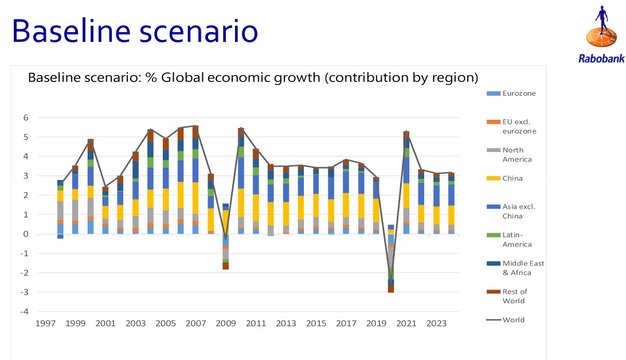The floriculture is hit hard by the COVID-19 crisis, but when looking at the past, present and future, how is the industry expected to develop and recover? Rabobank tried to predict the global economic impacts and the effects on the floriculture industry. Lambert van Horen, Analyst - Fresh Produce at Rabobank, a Dutch bank with clients all over the world, was present at the PMA Virtual Town Hall* last Wednesday (April 29), to give an insight in the scenario they outlined.

Lambert van Horen
Western world hit hard
When looking at the macro-economic baseline scenario, it is expected that a lockdown in a country takes about 3 months, that countries will reopen gradually - for many this will start in May -, and that it will take about 3 quarters to get back to the 'normal', without restrictions, van Horen explains.
 Click here for enlarged image.
Click here for enlarged image.
When looking at the global GDP, the impact for 2020 is expected to be -2.6%, with The Western world being hit hard (see graph above). "China and Asia (excl. China) are the only ones expected to have a (small) positive economic growth in 2020. Fortunately, for 2021, Rabobank expects the global GDP to grow with +5.3%."
Four stages to recovery
At Rabobank, effects during the recovery are divided in 4 stages. Each stage has an effect on the floriculture industry, which van Horen describes below.
Stage 1. Strict lockdown and border control
(currently in significant number of countries e.g. India, Japan).
"As we experienced the last four months, floriculture is not considered as a “vital” sector in any of these countries that are in a strict lockdown. Florist shops, garden centers, and street markets are mostly closed during this stage and supermarkets give priority to the supply of fruit & vegetables in their disrupted logistics. On top of that, there is significant reduced demand from public and private events (weddings, funerals, parties) and (food) services such as restaurants, hotels, and offices. As a result, there are immediate huge price falls and recovery is slow. In order to reduce cost of operation, companies have to rebase their operation level where possible to slow down production. Just after a short time there are some positive “cocooning” (staying inside one's home) effects on retail flower sales, lots of marketing/goodwill actions are being set up, and the internet sales increase enormously."
Stage 2. Semi lockdown, easing of restrictions
(currently in some South-East Asian countries, starting in Europe, starting in the USA).
"First of all, supermarket sales are going back to normal in this stage and florist shops and garden centers are reopening. However, it is expected that some growers and florists will stop their business, especially smaller businesses and/or specialty growers, with the crisis possibly leading to a smaller flower assortment. In this second stage, people are learning to deal with the new 6-feet economy and the supply chain is learning to deal with new logistics rules. However, airfreight restrictions and costs have a large impact on African and South American production and trade. As a result, some disruptions are expected to arise in breeding and propagation as lots of cuttings or in-vitro plants are produced in countries like India (in-vitro), Costa Rica, Guatemala, and Tanzania. Due to the re-opening there will be some price-recovery and improved demand. Also in this stage, “cocooning, especially regarding nursing home et cetera continues at a high level and government support programmes are set up for specific segments or companies. "
Stage 3. Lifting of lockdown and restrictions
(social distancing) (China).
"In this third phase all food services and retail outlets are open again. But flowers are not top of mind for customers like hotels, and catering companies. The current situation in China (e.g. Kunming) is an example for this stage. The cocooning effect will be disappearing, but on the other hand there is some recovery in event demand. The international travel slowly starts, therefore supporting recovery in African and South American floristry, albeit still at depressed levels from pre-lockdown."
Stage 4. Recession
"As stated earlier, Rabobank expects a global decline in economic growth for 2020. This will lead to a shake out in the market with continued closure of some businesses (growers, traders, logistics, florist shops) and consolidation. The higher unemployment levels will depress the demand for cut flowers and indoor potted plants - these purchases usually have a high correlation with economic development. The higher international air transport costs and lower capacity will cause some problems for African and South American supply. To our opinion it will take 4 to 5 years before the industry is back at the 2019-level. In addition to this, sustainability goals (like the Paris climate agreement) in (covered) horticulture might be more difficult to reach because of the lack of finance (e.g. for geothermal energy). "
For  more information
more information
Rabobank
Lambert van Horen
Email: [email protected]
www.rabobank.com
*Click here for the summary of the PMA Virtual Town Hall of April 29 and click here to register for the next PMA Virtual Town Hall scheduled on May 6.
